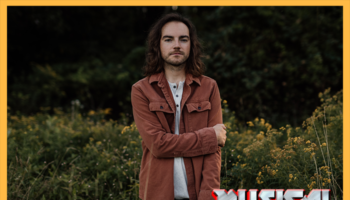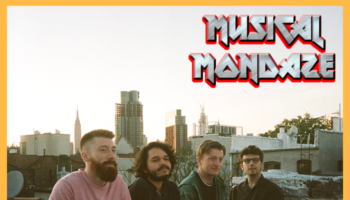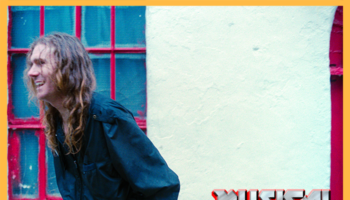 You don’t have to be in a funk just because it’s Monday. Instead, get funky!
You don’t have to be in a funk just because it’s Monday. Instead, get funky!
TrunkSpace brings you another edition of Musical Mondaze. This time out we’re sitting down with musician Elana Belle Carroll, who, as Party Nails, is making pop music irresistible again. “Come Again,” the new EP from the songwriter, is a time machine that offers a glance into a musical past filled with pop greatest and a glimpse into the future where this Los Angeles-based artist is continuing to carve out her own legacy of that very same greatness.
We sat down with Carroll to discuss her musical roots, the collaborative environment that is Party Nails, and her preparedness for mainstream recognition.
TrunkSpace: We read that you picked up your first guitar at age 11. What was your musical journey like from that moment to when you ultimately discovered the sound we hear on your debut EP?
Carroll: Yeah. I started playing my guitar when I was 11, mostly because my dad started playing and I kept hearing him doing it. My dad’s an illustrator and when he was waiting for his Photoshop stuff to render, because this was like years ago when Photoshop took forever to do stuff, he would pick up the guitar and just like, jam out to whatever he was listening to at the time. And I got so jealous of him, so I really wanted to do it too. I was like, “Why is he doing it?” And so I basically became obsessed with writing songs from that moment, I think. I was into notes and reading music. I knew how to do all of that stuff from earlier instruments that I had learned in school and I definitely loved doing that on the guitar too, but I think that it always represented a vehicle for songwriting for me. So that was a huge tool and then years later, in college, a friend showed me how to use Logic and gave me an audio interface so that I could record myself. That was a huge moment for me too.
Another huge moment was just when I started playing with pop ideas, which didn’t really happen intentionally originally. It was more like something that I thought I would do temporarily just to kind of challenge myself and to see what sort of opportunities there might be for me as a writer who also has another project kind of a thing. And I realized that I just really, really enjoyed developing that skill set and basically everything that had come before had been a vehicle for songwriting and that I was the sort of person that appreciated the depth that you could go into with songwriting. I’m sure every songwriter is that way, but I think the guitar was a huge moment for me because… I don’t know… I just like to think about sounds and the guitar is a very complicated instrument. It seems very simple. It’s deceptive. It’s sort of like a pop song. It’s deceptive in that it seems simple, but there’s lots of different kinds… especially when you start to learn classical guitar and all the different ways you can approach it and the sounds you can get just based on the shape of your fingernail. Honestly, pop music is really similar. Every single detail that you give to a recording becomes part of the effect the song has on the listeners. You can make the same song and have it feel retro or have it feel new… and those are just very superficial terms even. If I was younger… if I were 11 years old and somebody was like, “You’re going to be a pop songwriter and I’ll put you in the room with all of these people,” I don’t think I would have really attached myself to it. I think having a finger on the pulse of all those different aspects is what really enabled me to be interested, you know?
TrunkSpace: And what’s interesting about guitar is, for some guitarists, as soon as you hear them play one chord whether it’s on an acoustic or acoustic electric guitar, you know it’s being performed by that particular guitarist. Some people can just own an instrument and make it their own.
Carroll: Totally. Until I started really approaching singing as an instrument as well, I always wanted to be an incredible guitar player. Like, I always wanted to be a big solo kind of dude or something like that, but that’s just not my style because I always put more emphasis on the songwriting. I can definitely rely on it in a rhythmic sense and… it’s just a different relationship to the guitar than I thought I would have now that I have really started embracing singing.
There’s that with singing as well. Obviously it’s very clear when you hear somebody’s style or somebody imitating somebody’s singing style.
TrunkSpace: So when you sit down to write a Party Nails song, does it start on a guitar or does it start elsewhere?
Carroll: It really depends. Right now, the EP that’s out represents a pretty good sampling of different processes. I can’t wait to have more music out so that more processes are really unveiled, but it sort of depends. Whoever I’m collaborating with… none of those songs are me completely alone. It’s always some sort of collaboration, whether it be me and a writer or me and another producer or something like that. We just basically take whatever ideas we like the most and continue to make them into ideas that we like more and more and more. So, sometimes that idea might start from a drumbeat and I’ll come up with some melody and lyrics on top of it. Sometimes it starts with a melody and lyrics and then we add a drumbeat behind it. Like, the song “Come Again” had different verses for a long time and eventually it was like, “You know what, this actually isn’t gonna look like this.” It’s not going to look like a piano ballad with pop elements. It’s going to look like more of an 80s synth-driven pop song that might have ballad aspects. Those all come from just massaging. They all start different ways.
TrunkSpace: So then as an artist, do you have to go in with a really open mind when it comes to each individual song?
Carroll: Yes, and that’s definitely been a huge part of Party Nails for me is, exercising that open mind. I believe that every musician has a different thing that they’re doing and a different process  that they enjoy exercising, and for me, the work that I want to make through Party Nails, it requires of me to have an open mind in that way and to be willing to work with other people and be willing to harness that energy that I think comes from working with other people. The thing is, the reason that it’s not just a bunch of songs that I wrote with other people and that it’s Party Nails is because it’s funneling through this vision, if that makes sense? There’s a ton of other songs we made and they just weren’t part of the vision really.
that they enjoy exercising, and for me, the work that I want to make through Party Nails, it requires of me to have an open mind in that way and to be willing to work with other people and be willing to harness that energy that I think comes from working with other people. The thing is, the reason that it’s not just a bunch of songs that I wrote with other people and that it’s Party Nails is because it’s funneling through this vision, if that makes sense? There’s a ton of other songs we made and they just weren’t part of the vision really.
TrunkSpace: How much of you went into that vision? How long has the journey been to get where you are today and has it been a labor of love?
Carroll: I don’t know if I ever intended for Party Nails to be what it is. I don’t know if… I’m the sort of person that, like, it needs to happen so on a gut level and so realistically in order for me to learn every bit and piece of it and then it becomes part of me. So, looking back, I can really see how it started ages ago. I really believe it started when I started performing music that I was producing in New York before I moved to Los Angeles. At the time, I really thought that I was doing something that I was really excited about, but I see in retrospect the level of detail that I wanted to have in my work… and that’s what I’ve been working on since then. You know, that level of detail is like… you just can’t know until you’ve made it and until the work is done that that is what it was missing really. It just required lots of… a whole journey. It definitely has been a labor of love.
TrunkSpace: So putting that much of yourself into it both from a time and passion standpoint, were you nervous to release it to the public?
Carroll: I feel really lucky because I don’t really have reservations about releasing music. In some ways, I always wish that I did because I think that I’m so willing to commit and put things out that it makes me worry sometimes. Like, “Oh, no… what if this isn’t actually done?” (Laughter) But luckily, I just have a good safety net of creative people that I can bounce stuff off of and kind of use as models because they’re beyond me and really, really think about best practices as far as putting out new work. I think that initially that I wanted to rush more than I ended up rushing and I’m really glad that the EP came out the way that it did and that it came out in the time that it did and everything that goes along with that… the artwork and the people I worked with and all that stuff.
 TrunkSpace: Do you think that desire to rush new material out there has anything to do with our current social media culture and marketing firms telling us to continuously put content and ourselves out there in that space to stay relevant? Is that a pressure that you feel as an artist?
TrunkSpace: Do you think that desire to rush new material out there has anything to do with our current social media culture and marketing firms telling us to continuously put content and ourselves out there in that space to stay relevant? Is that a pressure that you feel as an artist?
Carroll: I think there are a number of things at play, but I think that the two things worth noting are what you said, which is this sort of mentality that because of social media there needs be this constant high quality content that you’re producing. Which is totally true, it’s just that… it doesn’t always need to be professional. It needs to be authentic and there needs to be a lot of it offered that is professional. It’s not like I have a massive following or anything, but… you do look at artists with massive followings who kind of came into their popularity in the age of social media. Meaning, not somebody who was famous 10 years ago who happens to have an Instagram account, but somebody who got famous in the last five years or so. You can’t do it without opening yourself up to that on a personal level, which is very different from, I think, 10 years ago. So it isn’t just professionally produced work, it’s also being willing to share your life.
But I also think that on the creative side there’s definitely this mentality that you shouldn’t be afraid to make a lot of stuff because you want to be able to pick the best stuff. There’s inherently going to be stuff that you throw away and that’s what I try to have an open mind about. Because it’s true, you don’t want to treat things like they’re precious and you just don’t want to shoehorn something because sometimes it’s just going to take a second for a song to know what it’s going to be. And other times a song just isn’t going to be on your first EP, or whatever. It just takes a second.
So I think there are two things at play there and it can really create a lot of pressure for somebody who’s creative minded who just wants to sort of do their thing.
TrunkSpace: If you woke up tomorrow and the EP was suddenly streaming from everybody’s cellphone and from every set of car speakers, would you be prepared for that kind attention and fame, and, to then have Elana become Party Nails?
Carroll: Yes and no. For me it’s so hard to imagine that being part of my reality, but at the same time, I’m working very hard to make work that could mean something to a lot of people. I don’t want to be really egotistical when I say that, but that’s what I think about. I don’t think, I want to be famous! I think, what do people like to sing? What do people like to sing to each other? What song is fun to put on the radio, and not just this year, but last year and five years ago or 10 years ago? What’s common between all of those things? So, yes, in some ways I am very prepared because I understand what that thing is, but in other ways, I literally just work on pop music all of the time and that’s all I think about. (Laughter)
Check out the TrunkSpace review of Party Nails’ EP here.


